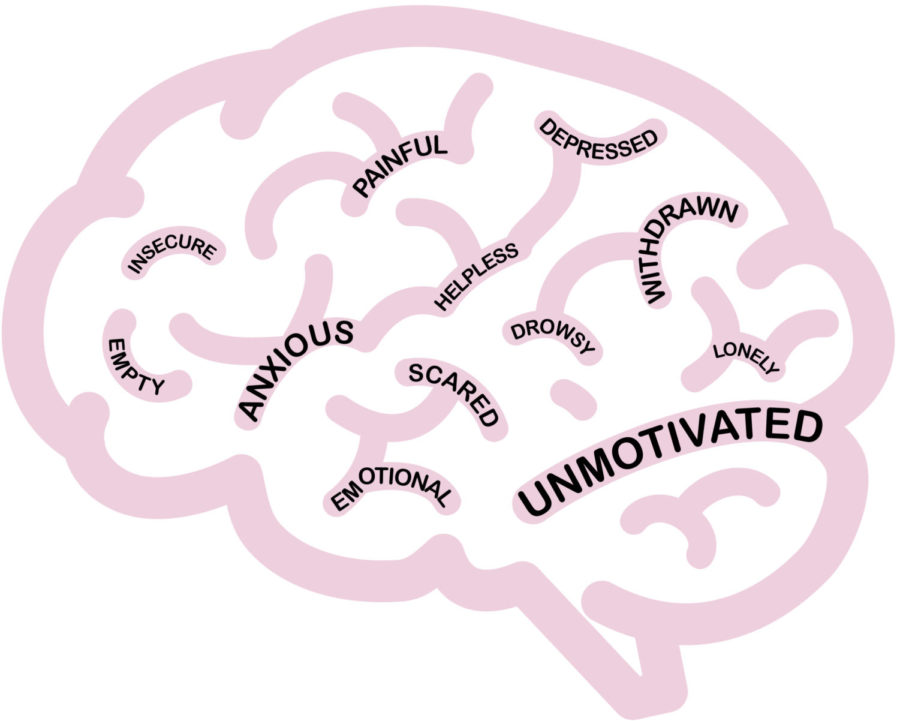Depression vs. sadness: Reporter tells personal story
January 15, 2015
“What are you feeling now?”
The counselor leaned forward ready to scratch her pen against her paper.
“Nothing,” I said. “I feel absolutely nothing.”
Depression is a mental illness, which can be caused by the chemical imbalance in the brain.
Nathaniel Wade, psychology professor, said in the clinical sense, depression is a syndrome marked by certain symptoms, such as loss of interest, sadness, sleep difficulties and more.
“Formally, somebody would be diagnosed through a clinical interview with someone who is trained to diagnose depression and they would look for those symptoms,” Wade said. “If they meet a certain criteria, then they would be considered diagnosed with depression.”
However, depression is not to be confused with sadness.
“I would distinguish [sadness and depression] in the terms of degree,” Wade said. “Sadness would be a description of an emotion or feeling that everybody has at some point in their life.”
Sadness also does not contain factors of suicide or self harm, while it is often seen in depression. It doesn’t take the duration or persistence that depression does. Sadness also does not dominate a person’s life, the way that depression does.
“Sadness is not usually accompanied by a sense of hopelessness,” said Dr. Carver Nebbe, a psychiatrist at Thielen Student Health Center.
Nebbe explains that depression can be a family trait or caused by lifestyle choices.
Wade said if someone is predisposed to be depressed or have depression, different events can trigger the feeling of depression, such as a criticism, rejection, a difficult time of life, an accident or traumatic experience, time of year or smaller events that are particularly important to a person.
“I think a lot of times people will think people who are depressed just need to snap out of it, or that there is a sense of will that they’re not using,” Wade said. “That [people with depression] are choosing to feel down. That is not true with depression at all.”
Wade said the importance of being open about depression can be life changing.
If a family member or friend suggests their loved one go to counseling, it could send the message to that person that seeking help is acceptable and often encouraged.
“Allowing them to talk about their experiences, it can be difficult, but I think balancing attending to them and caring for them when they are depressed with not treating them like they’re broken or fragile,” Wade said.
Nebbe emphasized the importance of knowing one’s boundaries.
“Try not to be judgmental,” Nebbe said. “Don’t be an expert. Telling a person not to use medication or dangers of medication or that therapy does not work [and] is not helpful.”
Routine can help people experiencing depression, with regular sleep patterns, balance eating and exercise habits.
This reporter’s story
At the age of 14, I sat in a dimly lit room facing a woman I had met only minutes before and was expected to give her, a complete stranger, permission to pick apart my deepest darkest thoughts in order to find a cure.
Flashing back three years before that moment, I sat in my living room as my parents explained their inevitable divorce to my siblings and me. That was the beginning of the end, or so I thought.
Divorce comes in all forms and the destruction it leaves in its wake can be brutal or barely noticed. This divorce left devastation in my eyes. After time passed, many thought I was going through a phase of teenage rebellion or just mourning the death of my parents’ relationship that had kept my family together.
Either way, I was creating chaos in my family’s lives. It began with poor decision making, followed by anger management issues. Respecting authority wasn’t one of my priorities, causing me to ruin my relationship with my mother.
After some time, I lost interest in activities that once consumed my life, quitting sports and bailing on clubs. I stopped attending family functions, including events as basic as family dinner. I stopped associating with friends, began locking myself in my room and refused to attend school.
I was numb.
It was years after the divorce when people began to worry about me. I watched them worried, heard their concerns but never listened, nor did I care. That was until my grandfather took my hand and began crying asking me, “where has my little girl gone?”
That was the only moment in my life I’d ever seen him cry.
After that moment, I was open to help, allowed my diagnosis and sat in dimly lit rooms while a stranger sat to analyze me. We realized that depression had run in my family and by some twist of fate it happened to land on me with the divorce as its trigger.
Learning to cope with depression took motivation and hope, both of which I had little to none of. I had to force myself to get up in the morning and make myself believe that I could get through the day. My loved ones encouraged me to try new hobbies and participate in group activities, even as simple as going to the movies.
Over time, the dimly lit room didn’t seem as gloomy as it did comforting. I was finally open to expressing my feelings and thoughts, which were slowly coming back to me as I learned how to empathize with people.
Seven years later, depression still attempts to fight me each day, however, I have learned to conquer it with coping methods learned through counseling. While I’ve never used medication, it is a reasonable option for those struggling.
I realized those suffering from depression have to want help in order to receive it. For those who know someone with depression it is important to stay patient. Dealing with depression is a slow process but taking it one day at a time with the people you care about to support you, it makes it bearable.

















